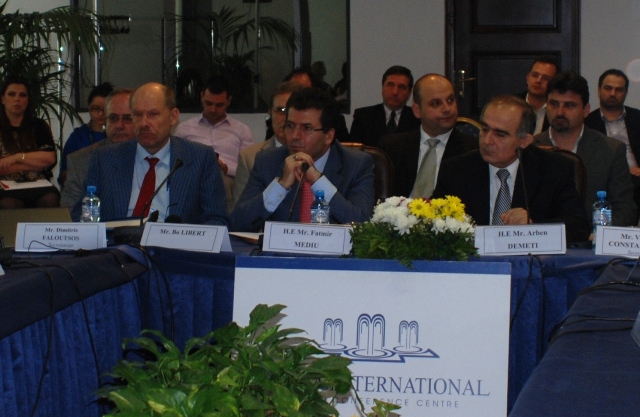
On 28 May 2013 in Tirana the five Drin River Riparians held the first Meeting of the Parties to a Memorandum of Understanding (MoU) on a Shared Strategic Vision for the Sustainable Management of the Drin River Basin. At the meeting, high-level representatives from the five Riparians decided on an action programme to strengthen their cooperation and to address urgent issues, such as flood management and improved monitoring and exchange of information, and outlined other priority steps to be taken, including raising public awareness and involving stakeholders in the management of the basin.
Among the competing uses for the water resources in the Drin Basin, which the Shared Strategic Vision aims to address, an important component is hydropower, with major dams and associated power stations in the former Yugoslav Republic of Macedonia and in Albania where hydropower accounts for more than 85 per cent of the total electricity supply. In addition, the basin faces a number of threats to its water quality, such as pollution from agriculture and discharges of untreated wastewater from cities. The exceptional biodiversity and endemic species of the Drin Basin are also under threat without improved and coordinated management of the ecosystem.
At the Meeting of the Parties, Riparians were represented by Fatmir Mediu, Minister of Environment, Forests and Water Administration of Albania; Shpetim Rudi, Deputy Minister of Environment and Spatial Planning of Kosovo (United Nations administered region, Security Council resolution 1244); Maro Evangelidou, General Secretary, Ministry of Environment, Energy and Climate Change of Greece; Velizar Vojinovic, Assistant Minister of Agricultural and Rural Development of Montenegro; and Stevo Temelkovski, Deputy Minister of Environment and Physical Planning of the former Yugoslavia Republic of Macedonia.
In advance of this first Meeting of the Parties, stakeholders met to discuss a US$ 4.5-million project, which will be an important contribution to the further cooperation in the basin. Among others, it will seek to improve the joint analysis and understanding of common problems and will set up demonstration projects on the benefits of sustainable development along the river and lakes in the basin. The project is funded by the Global Environmental Facility (GEF) with UNECE as one of the executing agencies.
The Drin Dialogue, which was set up to look into the many competing interests and challenges facing Riparians, and which led to the signing of the Memorandum of Understanding, is facilitated by the United Nations Economic Commission for Europe (UNECE) and the Global Water Partnership-Mediterranean.
Note to editors
The Drin Dialogue is a structured consultation process that aims to develop a shared vision among Riparian countries and stakeholders for the sustainable management of the Drin Basin. The Drin Dialogue is facilitated by UNECE and the Global Water Partnership-Mediterranean (GWP-Med) using the platform of the UNECE Convention on the Protection and Use of Transboundary Watercourses and International Lakes (Water Convention) and the Petersberg Phase II/Athens Declaration Process. It is part of Environment and Security Initiative (ENVSEC) work programme and is financially supported by the Swedish Environmental Protection Agency. The Drin Core Group, with representatives from all Riparians, has guided the process to establish the Shared Strategic Vision for the sustainable management of the basin.
The Drin Basin covers a geographical area that includes Albania, Greece, Kosovo (United Nations administered region, Security Council resolution 1244), Montenegro and the former Yugoslav Republic of Macedonia. The Drin River is the connecting body of this water system, linking the lakes, wetlands, rivers and other aquatic habitats into a single ecosystem of major importance. The region is very rich in endemic species and exceptional in terms of biodiversity conservation, and so has great potential for the development of sustainable tourism.
The UNECE Water Convention is an important legal framework for transboundary water management in the pan-European region. The Drin Dialogue is part of its work programme. Currently, 37 countries and the European Union are Parties to the Convention. The former Yugoslav Republic of Macedonia and Montenegro are preparing for accession; Albania and Greece are already Parties.
GWP-Med is a platform bringing together competent organizations working on water issues in the Mediterranean region. Created in 2002, this non-governmental organization promotes and exchanges knowledge on integrated water resources management for the sustainable use of the region’s water resources. GWP-Med is the technical secretariat of the Petersberg Phase II/Athens Declaration Process for South-Eastern Europe, a framework for the development of transboundary water cooperation in the region. For more information, see http://www.gwpmed.org.